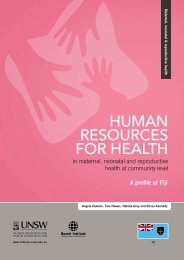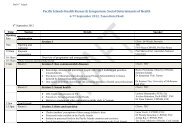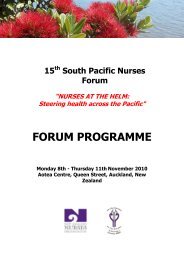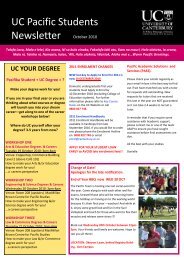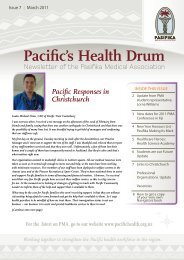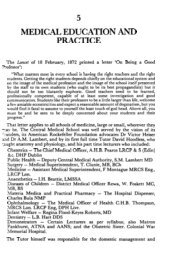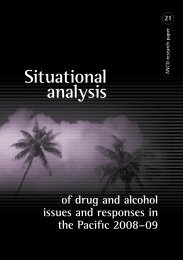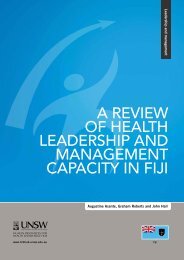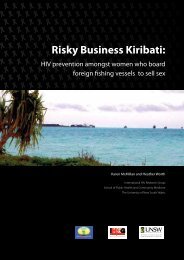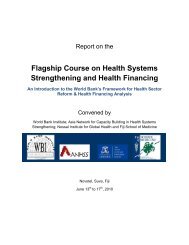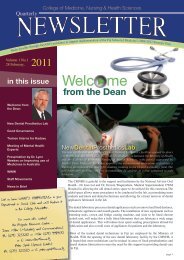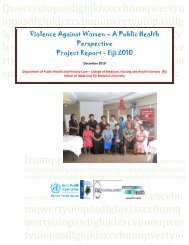rp21 situational analysis - Pacific Health Voices
rp21 situational analysis - Pacific Health Voices
rp21 situational analysis - Pacific Health Voices
Create successful ePaper yourself
Turn your PDF publications into a flip-book with our unique Google optimized e-Paper software.
Situational <strong>analysis</strong> of drug and alcohol issues and responses in the <strong>Pacific</strong><br />
176<br />
ingredient, along with discussions and singing<br />
and the passing on of pride in Tongan<br />
customs. The gatherings are said to be without<br />
violence or disorderly behaviour. 860<br />
There is a fear that alcohol has become a<br />
substitute for kava: ‘kava’s promotion of a<br />
gentle sense of contentment is being replaced<br />
with the violence so often associated<br />
with excessive drinking’. 861 Australian restrictions<br />
allow a traveller to bring in 2 kilograms<br />
of kava, pushing prices up from AU$30 per<br />
kilogram to around AU$200 per kilogram.<br />
The Tongan community proposed a system<br />
for kava club registration through the Tongan<br />
consulate-general, the Australian Government<br />
Department of <strong>Health</strong>, or another<br />
appropriate group, to allow for control and<br />
approval of the quality and supply of kava<br />
imported to Australia. 862 The argument for<br />
allowing kava rituals to promote traditional<br />
culture and prevent a shift toward increased<br />
alcohol consumption reflects the arguments<br />
in Tonga that increasing Westernisation and<br />
aspirations also increase alcohol consumption.<br />
For other countries in the <strong>Pacific</strong>, kava<br />
exports are a key contributor to GDP, though<br />
none of the material reviewed for this study<br />
provided such a view for Tonga.<br />
15.5 Local responses<br />
The PDARN delegate from Tonga reported<br />
that the Ministry of <strong>Health</strong>, the Ministry of<br />
Police, the Tonga Family <strong>Health</strong> Clinic, the<br />
Salvation Army Alcohol and Drug Awareness<br />
Centre and the National Centre for Women<br />
and Children on Violence are all collecting<br />
drug and alcohol data. 863 A key informant<br />
noted that while the Salvation Army has<br />
capacity to undertake drug and alcohol<br />
research and implement program responses,<br />
the sector remains under-resourced. However,<br />
there is a National Alcohol and Drug<br />
Advisory Board, whose membership includes<br />
the Salvation Army, Red Cross and the Tonga<br />
Family <strong>Health</strong> Association, which may be a<br />
vehicle to advocate for increased program<br />
funding. 864<br />
Legislation<br />
The main legislation for illicit drug issues is<br />
contained in Acts administered by the Ministry<br />
of Justice, including the Illicit Drugs<br />
Control Act 2003. Other relevant legislation<br />
includes the Drugs and Poisons Act<br />
1988, the Intoxicating Liquor Act 1988 and<br />
the Methylated Spirits Act 2001. 865 Tonga<br />
is a party to all three international conventions<br />
on illicit drugs. 866 The PIFS-endorsed<br />
860 In Tonga, people are not permitted to enter kava clubs/circles in an intoxicated state.<br />
861 Above, fn.859.<br />
862 Ibid.<br />
863 The authors were unable to determine how the submitted data may be influencing current<br />
programming.<br />
864 Personal communication, 2008.<br />
865 Legislation of Tonga is available at: .<br />
866 1961 Convention on Narcotic Drugs; 1971 Convention on Psychotropic Substances; 1988<br />
Convention against Illicit Traffic in Narcotic Drugs and Psychotropic Substances.



